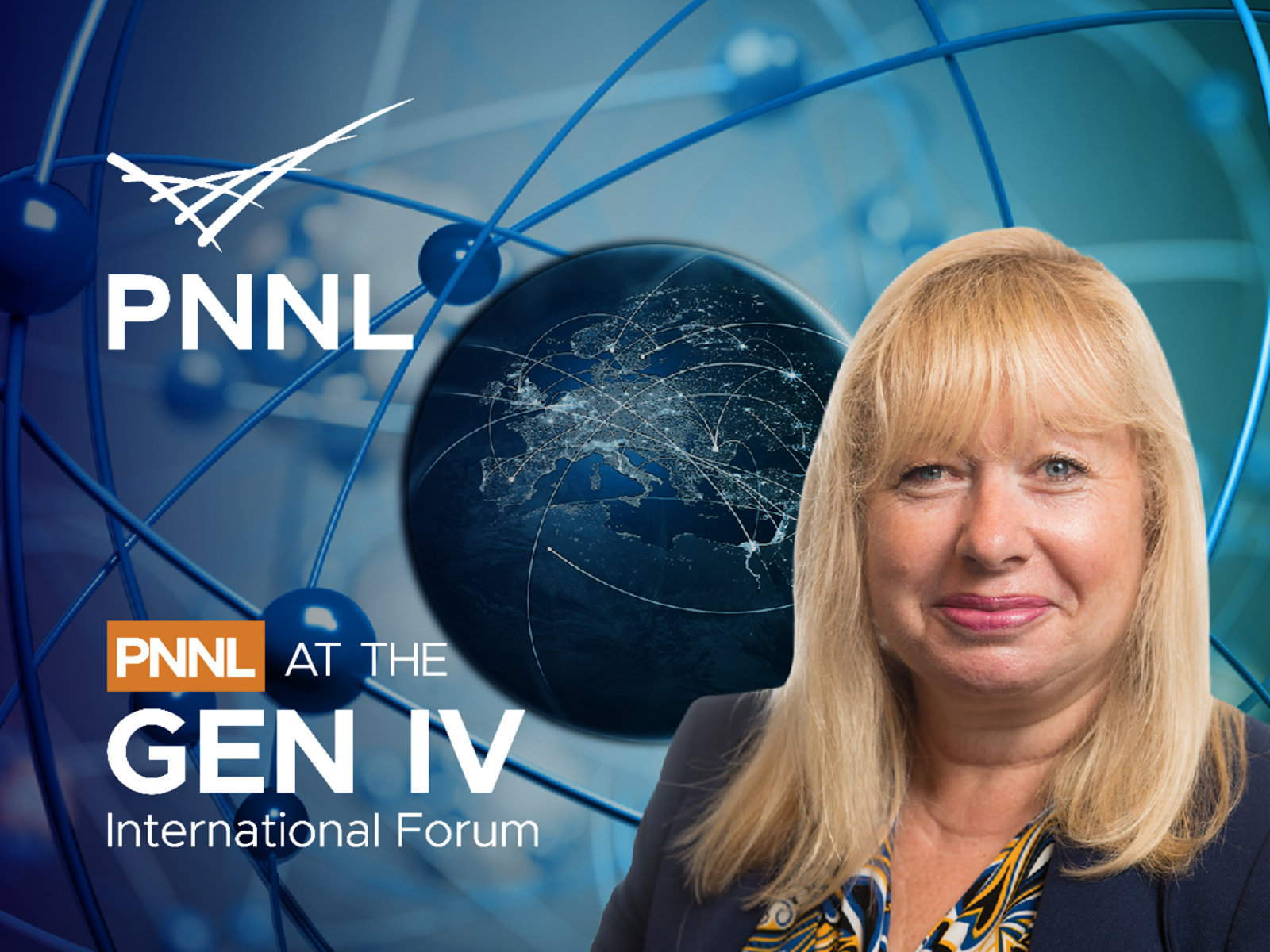Paviet Builds Global Gen IV Knowledge Base
100+ international webinars share advanced nuclear energy expertise

Patricia Paviet, senior technical advisor at Pacific Northwest National Laboratory and former chair of the Generation IV International Forum Education and Training Working Group (November 2015–December 2024.)
(Photo by Andrea Starr | composite by Melissa Willis | Pacific Northwest National Laboratory)
Over the last eight years, Patricia Paviet, senior technical advisor at Pacific Northwest National Laboratory (PNNL), has helped the world learn more about advanced nuclear reactors—one webinar at a time. Since 2016, she has organized and moderated more than 100 technical webinars through the Generation IV International Forum (GIF), creating a digital library of expert knowledge that has reached more than 15,000 viewers in 84 countries.
Hosted monthly and archived online, the GIF Education and Training webinar series covers advanced reactor systems, fuel cycle innovations, waste strategies, and more. Speakers have included top nuclear scientists, engineers, and student competition winners, with lively discussions following each presentation. The 100th webinar, presented by PNNL’s senior technical advisor for Advanced Materials Systems, Isabella van Rooyen, marked a major milestone for the initiative and reaffirmed the lab’s leadership in global nuclear dialogue.
“Every webinar is an opportunity to preserve knowledge, foster innovation, and connect the next generation of nuclear scientists with global experts,” said Paviet.
Advancing nuclear energy education
Paviet helped launch the GIF Education and Training webinar series shortly after joining the Education and Training Task Force in November 2015. The task force was elevated to a working group in 2019. The GIF currently includes 13 member countries and the European Union, with the United States now serving as an observer.
While she recently stepped down as chair of the Education and Training Working Group, Paviet remains actively involved and continues to lead the webinar series, which supports the forum’s mission to promote open education, preserve technical knowledge, and help develop the skilled talent pipeline needed for the deployment of six Generation IV nuclear reactor systems.
“We created this series not just to inform but to inspire,” said Paviet. “Our goal is to spark interest in advanced reactor systems and ensure knowledge is accessible, current, and global.”
The webinar series also supports new voices through programs like “Pitch Your Gen IV Research,” a competition aimed at students and early-career professionals. Winners present their work to a global audience, contributing fresh insight and innovation to the forum. Partner organizations—including the International Atomic Energy Agency, European Network for Education in Nuclear, and European Commission Joint Research Centre—have helped amplify these efforts across the nuclear energy landscape.
In addition to her work with GIF, Paviet has led another long-running series: radiochemistry webinars offered through the Department of Energy (DOE) Nuclear Analytical Management Program (NAMP) under the Office of Environmental Management. That series, launched in 2012, has delivered 77 webinars and continues to educate the community on nuclear analytical chemistry topics. (View the NAMP radiochemistry webinars.)
A leader in science and service
In addition to her international leadership role, Paviet serves as the national technical director for the DOE Office of Nuclear Energy’s Molten Salt Reactor (MSR) Program. Her work focuses on addressing technical challenges related to salt chemistry, corrosion control, off-gas management, MSR safety, and advanced materials performance.
Paviet joined PNNL in October 2018 after directing the DOE Office of Nuclear Energy’s Office of Materials and Chemical Technologies and brings more than 30 years of radiochemistry and nuclear fuel cycle experience. Her accomplishments include authoring book chapters, earning multiple patents, and receiving the 2019 American Nuclear Society (ANS) Significant Contribution Award for decades of leadership in nuclear research. She has also served on the ANS Board of Directors and held faculty roles at U.S. universities.
“The best way to lead is to share what we know,” said Paviet. “Whether it’s through research or global forums, our responsibility is to make science more open, more collaborative, and more impactful.”
Published: July 7, 2025